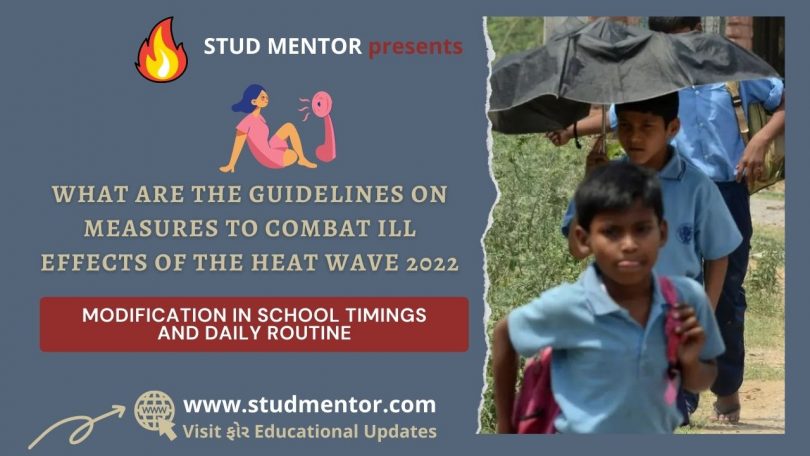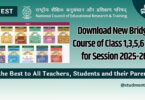Guidelines regarding precautions to be observed by schools to combat the ill-effects of the heat-wave Ministry of Education today issued following guidelines regarding precautions to be observed by schools to combat the ill-effects of the heat-wave.
What are the Guidelines on Measures to Combat Ill Effects of the Heat Wave 2022
1. Modification in School timings and daily routine
- School hours may start early and get over before noon. Timing may be from 7.00 AM onwards.
- Number of school hours per day may be reduced.
- Sports/other outdoor activities which expose students directly to the sunlight may be appropriately adjusted in the early morning.
- School assembly should be conducted in covered area or in classrooms with reduced timing.
- Similar care may be taken during dispersal after school is over.
2. Transportation
- School bus/van should not be over-crowded. It should not carry students more than the seating capacity.
- Drinking water and first aid kit should be available in the bus/van.
- Students coming to school on foot/bicycle should be advised to keep their head covered.
- Parents should be sensitised to pick-up the students themselves, to the extent possible, to avoid public transport and minimise their time out in the sun.
- School bus/van may be parked in a shaded area.
3. Hydration
- Students may be advised to carry their own water bottles, caps and umbrellas and use them when out in the open
- School should ensure availability of sufficient potable water at multiple places preferably at temperature lower than that of surroundings.
- Water cooler/earthen pots (pitchers) may be used for providing cold water.
- In every period, teacher should remind students to sip water from their water bottles.
- While going back home, schools must ensure that students are carrying water in their bottles.
- Students should be made aware of the importance of proper hydration to combat the heat wave and advised to drink sufficient water at regular interval.
- With increased hydration, use of washrooms may increase and schools should be prepared for it by keeping the washrooms hygienic and clean
4. Food and Meals
PM POSHAN:
- Heat can spoil food therefore hot-cooked meals under PM POSHAN must be served hot and fresh. In charge teacher may check the food before serving.
- Children carrying tiffins may be advised not to carry food that can turn stale quickly.
- Canteens in schools should ensure that fresh and healthy food is served.
- Children may be advised to have light food during lunch/tiffin.
5. Comfortable classroom
- School should ensure that all fans are functional and that all classrooms are properly ventilated.
- Availability of alternate power back up may be arranged, if possible.
- Curtains/blinds/newspaper, etc. may be used to stop the sunlight entering directly into the classroom.
- If any local traditional practices are being followed by the school to keep the surroundings cool such as ‘khus’ curtains, bamboo/jute chiks etc., they may be continued.
6. Uniform
- Students may be allowed to wear loose and light coloured cotton material dress.
- Schools may relax norms regarding uniform such as neck ties.
- Canvas shoes may be allowed instead of leather shoes.
- Students may be advised to preferably wear full-sleeve shirt.
7. First-Aid facilities
- Sachets of ORS solution, or salt and sugar solution to treat mild heat-stroke should be readily available in the schools.
- Teaching and non-teaching staff should be trained to provide first aid to students in case of mild heat-stroke
- Schools must ensure quick access to nearest hospital/clinic/doctor/nurse, etc. in case of heatstroke.
- Essential medical kits should be available in school.
8. Do’s and Don’ts for students
- Do’s& Don’ts regarding heat wave should be displayed at prominent places in the school. These may include the following:-
Do’s:
- Drink sufficient water- even if not thirsty
- Use ORS (Oral Rehydration solution), homemade drink like lassi, torani (rice water), lemon water, butter milk, etc. to keep yourself hydrated.
- Wear lightweight, light coloured, loose, cotton clothes.
- Cover your head by using cloth, hat or umbrella, etc.
- Stay indoor as much as possible
· If you feel faint or ill, see a doctor immediately
Don’ts:
· Do not go outside on an empty stomach or after consuming heavy food
· Avoid going out in the sun, especially in the afternoon if not required
· Avoid strenuous activities when outside in the afternoon
· Do not go outside barefoot
· Do not eat junk/stale/spicy food
9. Exam Centres:
- Children may be allowed to bring their own transparent water bottle in the examination hall.
- Examination centres should ensure availability of potable drinking water which is easily accessible to the candidates at the centres.
- Examination Centres should ensure that the candidates are promptly supplied water when asked for at their seats in the examination hall
- Examination halls may be provided with fans.
- Students waiting area at the examination centre may be in a shaded/covered area with provision of water.
- Linkage of examination centres should be made with local health worker and medical centres for any emergency.
10. Residential Schools
In addition to the above, residential schools may take the following additional measures:
- Essential medicines for common ailments related with summer season should be available with Staff Nurse.
- Students may be made aware regarding prevention of heat stroke.
- Windows in the dormitories should be provided with curtains.
- Lemon, butter milk& seasonal fruits with high water content should be included in the diet.
- Spicy food should be avoided.
- Continuous availability of water and electricity should be ensured in classrooms, hostels and dining hall.
- Sports and games activities should be conducted in the evening.


